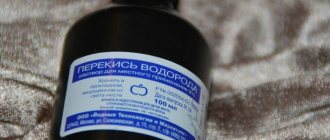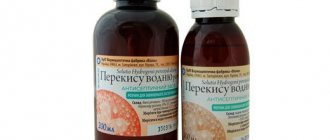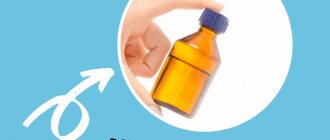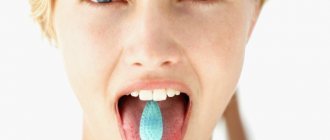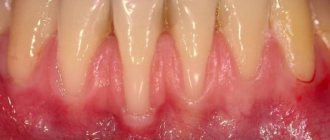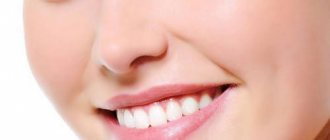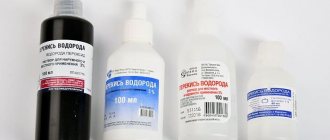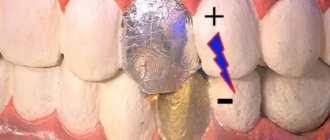Hydrogen peroxide is considered an effective disinfectant that can always be found in any home medicine cabinet. It has antiseptic properties and perfectly stops bleeding. Such qualities of this medical solution are often used to treat the oral cavity.
Many people who do not have a medical education have a question: is it possible to rinse your mouth with hydrogen peroxide? Will it cause harm? After all, this solution is considered an external agent that is not used internally.
Peroxide sanitizes the oral mucosa well, disinfecting it, as well as wounds on the skin. By rinsing your mouth with hydrogen peroxide, you whiten your teeth and get rid of pathogenic bacteria that cause bad breath. By preparing a mouthwash from this inexpensive medicine, you can:
- qualitatively improve the condition of the oral cavity and teeth,
- get rid of inflammation of the mucous membrane, periodontitis;
- reduce the number of sore throats.
To achieve a positive effect when treating the oral mucosa, you need to know how to rinse your mouth with hydrogen peroxide.
Tips and recommendations for using this medical solution will help with this, taking into account the positive and negative aspects of its effects on the mucous membranes and teeth. Keep in mind that peroxide is an acidic substance that can erode tooth enamel if your teeth are exposed to it too often.
Is it possible to rinse your mouth with hydrogen peroxide?
If teeth are not cared for correctly and regularly, pathogenic microorganisms develop on teeth, one of which is streptococcus. Gargling with hydrogen peroxide helps effectively combat them. The oral cavity is cleaned very well during this procedure.
Streptococci that live on tooth enamel contribute to the formation of caries, bad breath and the development of periodontitis. Improper use of a toothbrush does not allow you to effectively clean your teeth from pathogens that have accumulated on them.
Children do not always follow their parents' recommendations and spend more than one minute brushing their teeth.
To eliminate the negative consequences of improper daily brushing, you can use hydrogen peroxide to rinse your mouth, if you know how to do it. It is cheaper and no less effective than a regular dental rinse in cleaning the oral cavity.
An inexpensive care product helps protect not only teeth, but also prevents the development of colds during the cold season. Peroxide is in every home medicine cabinet, and it can always be purchased in the right amount without much damage to the family wallet.
But since the solution is not intended for internal use, its taste, especially to a child, may seem unpleasant. Therefore, parents often ask doctors whether it is possible to rinse their children’s mouths with peroxide and whether such a rinse will irritate the mucous membranes of the mouth and throat?
To eliminate the unpleasant taste of peroxide, you can add a few drops of peppermint oil and dilute the concentrated liquid with water. In this case, the taste of the mouthwash will be pleasant. Components in the form of essential oils will only improve its composition.
How to use peroxide to treat gums
Treatment of gums with hydrogen peroxide is carried out in three ways: rinsing the mouth, brushing teeth, and taking it orally.
How to rinse your gums with hydrogen peroxide
The rinsing procedure helps with acute inflammation and infectious diseases. You can rinse your gums not only for therapeutic purposes, but also for hygienic treatment of the oral cavity. The duration of the procedure should be 10 minutes, but no more. It is recommended to rinse your gums 4 times a day. It is important that hydrogen peroxide does not enter the esophagus, as it can burn the mucous membrane.
Teeth cleaning
To clean your teeth, it is recommended to apply 3-4 drops of the drug to a toothbrush with toothpaste. For periodontal disease, it is recommended to use a brush with soft bristles, so as not to further injure the gums, but to massage them, which will enhance the healing properties of hydrogen peroxide.
Taking hydrogen peroxide orally
The cause of many oral diseases is local microcirculation disorders and systemic circulatory failures. Therefore, it is possible to use the drug internally to improve the functioning of the circulatory system. An hour before meals, you need to drink a solution: 50 ml of water and 1 drop of 3% hydrogen peroxide. In the following days, the dosage should be increased by 1-2 drops, taking into account the condition of the body.
Rinse your mouth with hydrogen peroxide: general instructions
To maintain a snow-white smile and get rid of bad breath without spending a lot of money, you need to know how to rinse your mouth with hydrogen peroxide. Using a simple and affordable recipe allows you to:
- avoid caries;
- prevent stomatitis;
- cure gingivitis;
- protect gums from periodontitis.
To carry out preventive procedures, 3% hydrogen peroxide should be used; mouth rinsing should be done with water to which concentrated peroxide is added. Proper use of this rinse aid will give positive results.
Using a concentrated solution allows you to whiten your teeth faster, but this is dangerous and unacceptable when using such a mouthwash for children. Adults should also not overuse this type of whitening, as the acidic environment can destroy tooth enamel.
A recipe tested in practice by many people will tell you how to rinse your mouth with peroxide correctly. You should also consult with your doctor if a person has chronic inflammation of the mucous membrane or other diseases. This medicinal solution can be used for stomatitis or burns of the oral mucosa.
For half a glass of boiled water, you will need one tablespoon of hydrogen peroxide for rinsing your mouth. You should use this homemade rinse after cleaning with regular toothpaste. Various chemicals are added to dental care products sold in pharmacies and stores.
Therefore, it is necessary to carefully remove any remaining toothpaste after using it, since hydrogen peroxide for the oral cavity can interact with its components, having a negative effect on tooth enamel and mucous membranes.
The prepared solution should be kept in the mouth for at least one minute, thoroughly rinsing the mucous membranes and teeth with it. The product should sizzle a little, as it does when treating open cuts on the skin. This is normal for this type of dental rinse. A slight pain effect is possible in the presence of stomatitis. But it usually goes away quickly.
If the pain does not stop for a long period of time, then rinsing your mouth with peroxide cannot be done.
This means that such a solution causes irritation of the mucous membrane and should be discarded by choosing a mouthwash that is milder in action. The liquid should not be swallowed; it should be spat into the sink after rinsing.
Coping with an illness successfully and without harm is not difficult! Hydrogen peroxide for stomatitis
Stomatitis occurs due to infectious diseases, herpes, and accumulation of bacteria.
In children of the first year of life, formations in the oral cavity occur due to exposure to a fungal infection.
To avoid discomfort, treatment should be carried out promptly. At home, it is necessary to carry out pain relief and disinfection.
Relatives can quickly become infected with stomatitis. Therefore, it is better to isolate the infected person: allocate a separate towel, cup, spoon.
ontakte
Odnoklassniki
The product is odorless and colorless. Hydrogen peroxide is a liquid that instantly decomposes when interacting with bacteria.
The chemical formula of the drug is H2O2. The product is intended for external use only, effective for inflammation of the oral cavity, tonsillitis, stomatitis.
It also disinfects and cleans open wounds, stops bleeding.
When interacting with body tissues, violent chemical reactions begin, promoting the separation of dried blood and accumulations of pus.
For stomatitis, the drug is used as part of complex therapy to cleanse the oral cavity before applying medicinal gels. They can be used to rinse your mouth and treat ulcers. The product effectively relieves pain in the inflamed mucous membrane.
Contraindications
Sometimes people don't realize that there are restrictions when taking medication. When using hydrogen peroxide, you also need to make sure that it does not cause harm.
Contraindications:
- Children under three years of age.
- Allergic reaction to an antiseptic.
- Intolerance to the taste of the drug.
- Period of taking antibiotics.
- Exacerbation of chronic kidney and liver diseases.
In all other cases, the antiseptic is safe to use. But on the condition that it will not be swallowed.
Photo 1. An example of white plaque in the oral cavity on the tongue of a child with inflammation of candidal stomatitis.
Rinsing for adults
Adult patients should use a solution with a concentration of 3%. Pharmacies also sell 6% hydrogen peroxide, but it is intended for treating skin.
Use the product as follows:
- Lotions: moisten a cotton pad and apply to the sores in the mouth. It is advisable to use a drug whose concentration is 0.25%.
- Rinse: dilute a tablespoon of the drug in a glass of water. The mouth should be rinsed for at least five minutes. The procedure is repeated 5–6 times a day.
After treatment, it is important not to drink or eat food for 20 minutes. It is also necessary to ensure that the person does not swallow the liquid, as a burn to the gastric mucosa may occur.
Treatment for it in children
Despite the simplicity of the procedure, you should know certain rules for rinsing the mouth. Sometimes the taste of the drug causes persistent disgust and leads to vomiting. Therefore, if complaints of nausea occur, the child should stop using the drug.
Important! A child under 10 years of age should not be left alone during the procedure. For one rinse you need to take 150 ml of drug solution
For one rinse you need to take 150 ml of the drug solution.
The child should gently rinse the mouth with a small amount of peroxide for 30 seconds. After this, the product is spat out and a new one is taken.
You need to rinse twice a day. The duration of treatment is selected individually depending on the speed of recovery.
The difficulty in treating the disease in infants is that they cannot rinse their mouths. Therefore, the oral cavity in infants is cleaned as follows:
- Hands are treated with an antibacterial agent.
- Sterile gauze is moistened with peroxide.
- They wrap it around mom's finger.
- A finger is gently passed along the mucous membrane of the child’s oral cavity.
Hydrogen peroxide is called a universal remedy that can stop the inflammatory process or disinfect wounds. But the liquid only eliminates the symptoms of stomatitis without affecting its causes.
The video describes in detail the process of treating stomatitis by rinsing the mouth with a solution of hydrogen peroxide.
When used carefully and correctly, hydrogen peroxide will help to successfully cope with oral problems and will not harm the body. But treatment must also be carried out by other means. It is advisable to consult a doctor before use.
Rate this article:
Be first!
Average rating: 0 out of 5. Rated by: 0 readers.
ontakte
Odnoklassniki
How to dilute hydrogen peroxide for mouth rinse
Peroxide should be diluted with warm boiled water in a ratio of 1:11. To improve the taste of the mouthwash, you can add a few drops of mint or lemon oil. This improves the taste and does not impair the whitening properties of the rinse aid.
If during and after the procedure an unpleasant aftertaste remains and painful sensations last for a long time, then the concentration of the rinse aid should be reduced. The addition of essential oils enhances the effect on painful microflora in the mouth and makes the peroxide more pleasant to the taste.
You should rinse your mouth after brushing and removing any remaining toothpaste with water. To quickly whiten, sometimes people wipe each tooth with concentrated peroxide, but in this case the color of the enamel may turn out uneven. If you need to wipe each dental unit separately, then after this you should definitely wash off the remaining peroxide from the surface of the enamel, otherwise the aggressive environment will destroy it.
For safe whitening, you should not wipe, but rinse your mouth with hydrogen peroxide. People have only positive reviews about this method of whitening. To regularly combat caries, you need to do this rinsing regularly.
Benefits of peroxide for teeth
There are three most popular ways to whiten enamel at home:
- Whitening toothpaste . You can use any paste, but it is best to use one with added fluoride. This minimizes the risk of side effects for the enamel. Apply the paste to the brush, then add a few drops of lemon juice and peroxide. The method is not very gentle, but also not very aggressive.
- Whitening with peroxide and soda . This method is quite effective, since it ensures that two substances work simultaneously. To whiten teeth, you will need 3% peroxide and regular baking soda, all components are mixed until a paste forms. You need to brush your teeth with this composition without using a brush, since the effect on the enamel will be excessively aggressive. Apply the paste with your fingers, massage a little and rinse with water. It is necessary to ensure that the composition does not get on the gums, this can lead to irritation.
- Rinse . 3% peroxide is required, before use it must be diluted with water in a 1:1 ratio. So, the concentration of the composition will be 1.5%. First, brush your teeth with a toothpaste containing fluoride, then rinse your mouth with the solution for a minute. Finish by rinsing your mouth with clean water. After half an hour, the consumption of any food is prohibited.
How to rinse your mouth with hydrogen peroxide
In diluted form, peroxide is safe for human health if it is not abused when caring for the oral cavity. You can rinse your mouth with peroxide every day for a short period if you have gum disease or tooth decay. In the absence of diseases, rinsing should be done no more than once or twice a week.
Such prevention will help protect teeth from the development of plaque and pathogenic microflora on them. There are no contraindications to this rinse aid. If the composition gets on the skin around the mouth, irritation may occur. To eliminate them, you need to rinse your lips and the skin around them with water after rinsing and lubricate them with an emollient cream.
If you follow the recommendations, rinsing your mouth with hydrogen peroxide will not have negative consequences. Reviews from people using this simple and accessible recipe are mostly positive.
How to properly prepare a rinse solution
So how to prepare a mouthwash to get only a positive effect? It is important to adhere to the recommended proportions. Take a teaspoon of hydrogen peroxide and dilute it in 200 ml of clean and warm water. Mix thoroughly. This will give you a solution (3%). The fact is that this concentration is considered quite effective and safe for use when rinsing the mouth. There is one important nuance that you must consider. When preparing the solution, pour hydrogen peroxide into a glass of water, and not vice versa.
Hydrogen peroxide for bad breath
If a person has an unpleasant odor from his breath, he should rinse his mouth with peroxide in order to get rid of such a defect very quickly. Sanitation ensures the death of pathogenic microbes on the teeth, gums, tongue and mucous membranes. As a result, the unpleasant odor disappears.
Peroxide rinse really helps fight plaque, which is where pathogens live, but you shouldn’t overuse it. Since diluting hydrogen peroxide for mouth rinsing is very easy, you should do this immediately before rinsing.
Peppermint tea for toothache
Peppermint leaves soothe toothache, and one of its components, menthol, fights bacteria and kills bad breath. 3 in 1 for dental problems!
One teaspoon of dried mint leaves per glass of boiling water, cover with a lid and leave for 15-20 minutes. Cool the infusion and rinse your mouth as needed.
If you happen to have mint tea in a sachet at home, use it for compresses! Place the warm and moist bag remaining after brewing tea under your cheek and hold for a couple of minutes.
As a temporary pain reliever, place a cotton ball with a few drops of peppermint essential oil (be sure to dilute it!) on the sore tooth.
Reviews of mouth rinse with hydrogen peroxide
People who have used this simple recipe to care for their teeth and gums have noticed a noticeable improvement in their condition. But there are also a lot of negative reviews, including from doctors. Doctors themselves use peroxide for professional dental cleanings and whitening, but such procedures are not carried out regularly. Therefore, it is unacceptable to abuse peroxide for dental care. It is better to do this under the supervision of your dentist, taking into account his recommendations.
Using this disinfectant solution, the oral cavity and teeth are disinfected during dental treatment. It is used for laser whitening. In this case, peroxide is added to a special gel.
Therefore, using this rinse at home will be useful and safe if you know how to dilute hydrogen peroxide for rinsing your mouth. You can consult your dentist on this issue when you come to him for an appointment or for treatment of teeth and gums.
When using such a solution, you should remember that it should not be abused, since systematic use of peroxide can lead to changes in the condition of the mucous membrane and soft tissue surfaces.
You can also brush your teeth using hydrogen peroxide. This is discussed in more detail in the next video.
Gum diseases
Aloe vera juice, which can be squeezed from the leaves of a house succulent, has long been used to treat burns and minor cuts. This remedy is also good for gums. Research has shown that aloe vera has antibacterial properties against common periodontitis pathogens and can be used in dentistry.
Simply apply the fresh juice to the affected areas of your gums and rub in gently.
Diseases on the gums cannot be ignored and, if detected, treatment must be started immediately. One of the effective pharmaceutical products is hydrogen peroxide, which, due to its antimicrobial and antibacterial properties, is ideal in the form of mouth rinses as a prophylactic agent.
Active oxygen prevents diseases of the gums and mucous membranes, eliminates caries, removes plaque left after brushing teeth, relieves toothache and halitosis (bad breath). The drug is also applicable if periodontal diseases already exist.
Oral administration
Hydrogen peroxide is familiar to almost everyone as a remedy in the home medicine cabinet for disinfecting wounds and stopping bleeding. This chemical compound (more correctly called peroxide) has such universal properties that it is used in a wide variety of areas. Hydrogen peroxide helps with toothache, has an antibacterial and disinfectant effect, and is used as a bleach and even as a component of rocket fuel.
The method of using hydrogen peroxide depends on the proportion of the active substance in the composition of the drug. The most commonly used medicine is a 3% solution. This concentration of hydrogen peroxide is suitable for rinsing the mouth for diseases of the gums and teeth.
The antiseptic and bactericidal properties of hydrogen peroxide help fight pathogens that contribute to the development of various oral diseases. These are diseases of the teeth and gums, lesions of the mucous membrane and soft tissues. Bacteria lead to infection of the oral cavity and cause inflammation when they enter the cavities of a decaying tooth.
Rinsing with an antiseptic solution destroys pathogenic microorganisms, which disinfects the oral cavity, eliminates unpleasant odor and helps eliminate plaque on the teeth and tongue. The effect of peroxide can be enhanced by combining it with other medicinal products: tinctures, herbal decoctions and extracts of medicinal plants. For dental problems, chamomile, sage, oak bark, calendula, as well as propolis and soda with salt are widely used.
You can rinse your mouth with hydrogen peroxide without harm to your teeth and body, but only with a solution with a concentration of no more than 3%. When rinsing your mouth with this liquid, several effects occur simultaneously:
- Disinfection of the oral cavity.
- Acceleration of healing of wounds and inflamed mucous membranes.
- Drying of the mucous membrane.
- Enamel whitening.
- Stopping minor bleeding.
- Cleansing the oral cavity from crusts, scabs, remnants of blood clots after injuries and operations.
This complex effect has led to the widespread use of this product in dentistry. Dentists prescribe peroxide rinses for the following conditions:
- Oral infections – stomatitis, candidiasis.
- Inflammatory processes - gingivitis, periodontitis, periodontal disease.
- Bleeding gums.
- Presence of dark spots on the enamel.
- The presence of bad breath is halitosis.
The product is used in the treatment of sore throat, otitis media and runny nose, as well as when lips become inflamed due to herpes. To do this, take a diluted solution, but it can only be used after consultation with the attending physician.
Before you rinse your mouth with hydrogen peroxide, you need to dilute it. It is recommended to take a tablespoon of hydrogen peroxide per glass of water. The solution should not be hot, but not cold either. Rinsing begins only after thoroughly brushing your teeth and rinsing the mouth with clean water; such manipulations will prevent unwanted chemical reactions between the components of the drug and the toothpaste.
The peroxide solution should not be kept in the mouth for too long; it is recommended to carry out the procedure for no longer than 10 minutes. During this time, you should periodically spit out the liquid and put a fresh portion into your mouth. After the procedure is completed, the product is spat out so that it does not remain in the mouth or enter the digestive system.
What happens when hydrogen peroxide interacts with the skin
When hydrogen peroxide gets on damaged mucous membranes or skin, it is affected by the enzyme catalase. Under its influence, the peroxide decomposes. This releases oxygen. Thanks to this, the blood clots quickly. In addition, conditions on the skin that are very unpleasant for the development of infection are created. But this effect does not last long. However, hydrogen peroxide is very often used precisely in order to properly treat the wound and disinfect it. It is acceptable to treat open wounds with this solution. But it is best to use it to treat minor scratches. This product is perfect for children. When it comes into contact with a wound, it does not sting, has no color or odor. But if we are talking about an open wound, then a burning sensation is possible.
Hydrogen peroxide is also used in the food industry. It is used to disinfect equipment surfaces that come into contact with the food products themselves. In Tetra Pak technology, this substance is used to disinfect all kinds of packaging for juices and milk. It is also used in the production of electronics.
As you can see, hydrogen peroxide has many uses. We looked at how to use it as a mouth rinse. But do not forget that this substance can be very dangerous, so do not swallow it under any circumstances!
As a whitening agent
When whitening teeth at home, peroxide solution is also often used. In order to make your smile snow-white, you need to rinse your mouth with this product twice a day, after each brushing of your teeth.
You can also use peroxide instead of regular toothpaste - simply moisten your toothbrush in it and carry out a hygiene procedure, or prepare a “paste” by mixing the drug with baking soda. With regular use, the effect of using this product is clearly visible to the naked eye after 10 - 15 days.
